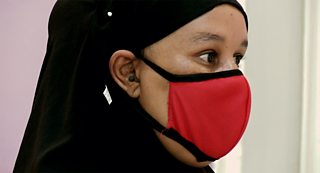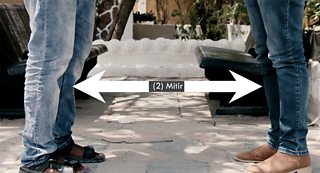Conflict, flooding and now coping with the COVID-19 pandemic in Somalia
Mohammed A. Gaas
Deputy Country Director, Somalia
As the number of confirmed cases of COVID-19 increase across Africa, and the World Health Organization warns the pandemic is accelerating, we fear the novel coronavirus is spreading within and from densely populated urban areas on the continent. Rising cases in Somalia’s capital Mogadishu are especially worrying, which is already disrupted by years of conflict, and struggling to support thousands of internally displaced people (IDPs).
Recent flooding has also increased the number of internally displaced people into urban areas, creating the perfect environment for infectious disease such as acute watery diarrhoea and measles. And there are concerns that the virus will further spread, unnoticed, in congested camps.We at Βι¶ΉΤΌΕΔ Media Action are still working to ensure programmes and training continue to help support the most vulnerable members of society.

We’ve started this by working to ensure the safety of our staff in our Somalia office, especially production teams and contributors, without compromising our programmes’ quality or audience engagement. We provide handwashing stations, sanitizers, gloves and masks at all times, and keeping distance is also observed by everyone in the office. Most of our staff are advised to work from home, observing safety measures including avoiding public transport and visiting crowded places.
In our work, we have adapted in part by conducting remote mentoring with our partner stations throughout Somaliland and Somalia. Our production teams have adopted new formats that allow the incorporation of COVID-19 related themes in their programmes. The teams collect questions from our audiences, which are then answered by health, traditional and religious experts. Drama programmes are now examining how characters change their behaviours in light of COVID-19.

Somalis have adopted a ‘keep distance and hygiene’ slogan, ‘Hay Taban Hays Taban.’ But maintaining distance and sticking to strict hygiene rules is a huge challenge in the warm social culture of the Somali people. The traditional elders advise others to avoid traditional greetings, which include hand-shakes and embracing. They also advise newly appointed Sultans (Traditional leaders) and Agils (traditional chiefs) to avoid sipping milk from one shared pot at traditional ceremonies, as they would normally do, but rather use different containers instead.
Our programmes welcome religious leaders to give an Islamic perspective on COVID-19. They convey very encouraging messages through examples from the Holy Koran, such as how quarantine was practiced when a town was infected by cholera; those in the town remained in lockdown and those outside the town did not enter. They ask their congregations to perform ablutions at home, to pray in the mosque at a distance of 1.5m apart, and to put cloths down to avoid faces touching the carpet.
Religious leaders put more emphasis on COVID-19 in their Friday sermons and advise congregants to adhere to the WHO and Ministry of Health directives. They also dispel misinformation, amid common beliefs that COVID-19 cannot affect Muslims, or that it may be cured by spices, khat or camel milk.
Health experts are providing good preventive messages to our audiences. But we still face challenges, particularly in rural communities where it is not always understood that gloves and masks are meant for one person and one-time use.
These are difficult times for the people of Somalia, who are already suffering not only from flooding and conflict but now an outbreak of locusts. The country’s health systems have been impacted by decades of civil war, without the intensive-care hospital beds needed for a serious COVID-19 outbreak. Amid these many challenges, information can save lives: providing people with the tools to understand how to help protect themselves, and when and how to seek treatment.
--
Mohammed A. Gaas
Deputy Country Director for Βι¶ΉΤΌΕΔ Media Action in Somaliland and Somalia
